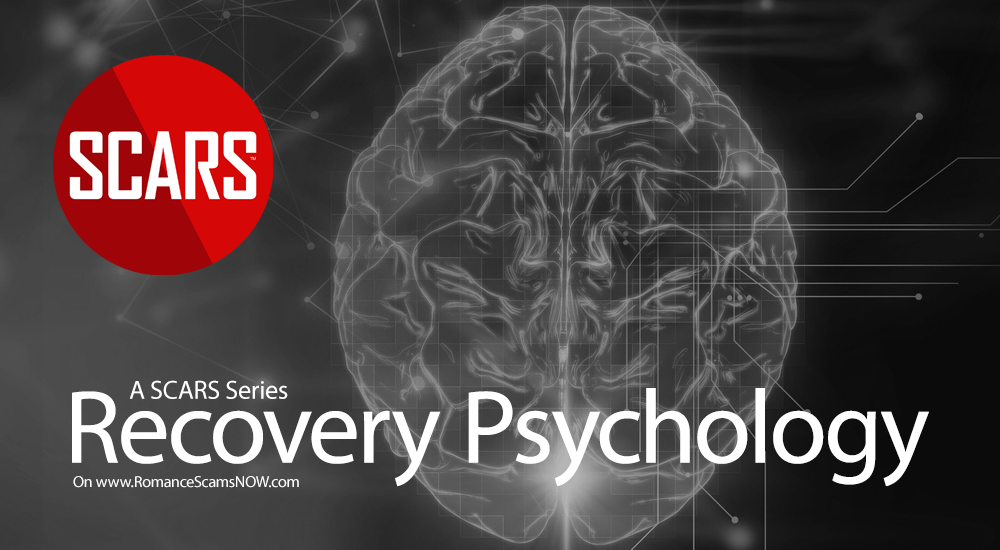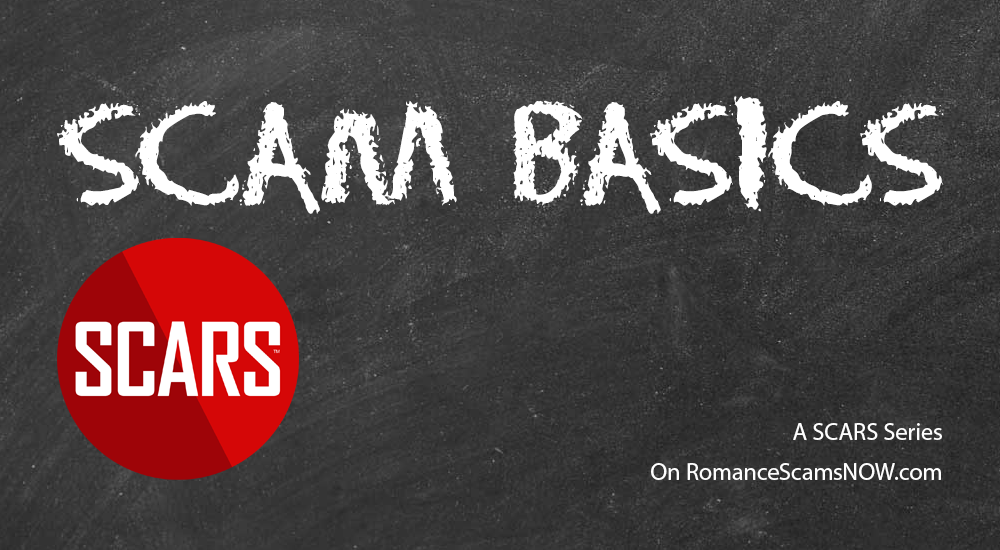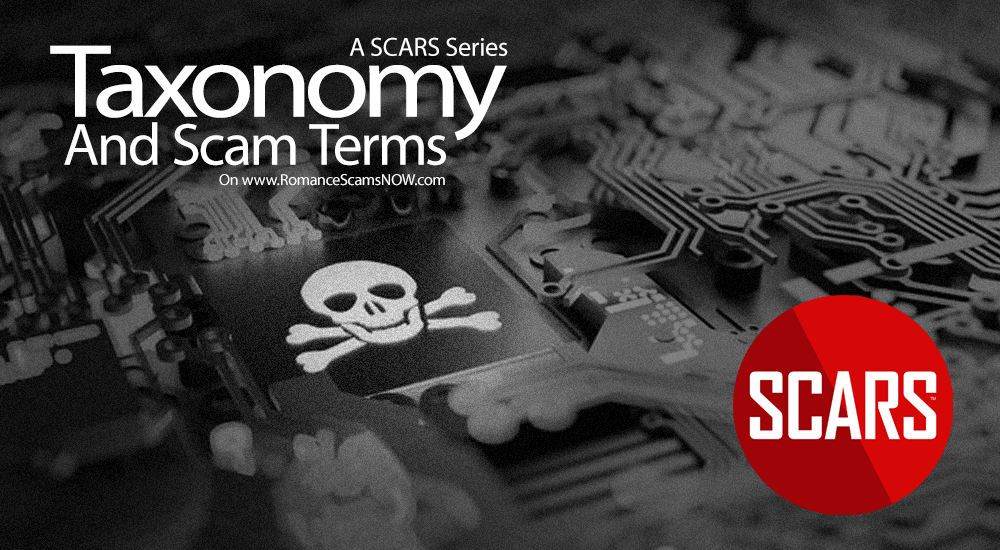
SCARS Institute’s Encyclopedia of Scams™ Published Continuously for 25 Years

The SCARS Official Definition Of The Terms & Types Of Scams
SCARS, as the leading provider of scam victim support and victim assistance services worldwide, has polled victims around the globe to develop a better taxonomy of the types of scams.
Part of the intent behind this new taxonomy is to use less abusive terms for the types of scams now being used that continue to traumatize, insult, and blame victims. SCARS will begin utilizing this new taxonomy of terms beginning in 2023.
However, please note that in our articles and publications, we will have to continue to use older terms, such as catfishing and pig butchering – even though they are triggering – because these are the terms that many (most?) victims use when looking for this type of information. We apologize for any emotional distress this may cause fraud victims.
The Three Types Of Scams
In SCARS view there are three types of cyber-enabled scams or crimes:
- Relationship Scams
- Targeted Scams
- Cyber Attack Scams
Note this excludes pure cybercrimes – where one system attacks another.
A. Types Of Scams: The Relationship Scams
Relationship Scams involve a TRUST relationship between the victim and the criminals. This type of scam can take minutes to months to develop a trust relationship.
These include:
-
- Romance Relationship Scams (Romance/Love/Dating Scams) – Romance scams are a type of online fraud where scammers create fake profiles on dating sites or social media platforms to form relationships with unsuspecting victims. They gain their trust and affection, and then ask for money or personal information under false pretenses. Victims can suffer financial and emotional harm.
- Investment Relationship Scams (Pig Butchering) – Investment scams, formerly known as pig butchering scams, are fraudulent schemes that promise high returns on investments but instead swindle victims out of their money. Scammers often use high-pressure tactics, fake credentials, and false information to gain the trust of their victims. Investors can lose significant amounts of money or their entire life savings.
- Extortion Relationship Scams (Sextortion. Grandparent, Emergency, Blackmail, Threat-based scams) – Extortion scams, such as sextortion, are a type of cybercrime where criminals threaten to expose embarrassing or sensitive information about the victim unless a ransom is paid. Scammers may use tactics such as blackmail, impersonation, or social engineering to coerce their victims into paying. This can cause significant emotional and financial harm to the victim.
- Lottery/Sweepstakes Relationship Scams – Lottery or sweepstakes scams are fraudulent schemes that trick victims into believing they have won a prize, such as a lottery or sweepstakes. Scammers may ask for money or personal information to claim the prize, but the prize does not exist. Victims can lose money or become victims of identity theft.
- Marriage Relationship Scams – International marriage scams are a type of romance scam where scammers target individuals looking for a spouse, usually through online dating sites or social media platforms. The scammer gains the victim’s trust and then requests money for travel or visa expenses, but never shows up. Victims can suffer emotional and financial harm.
- Services Relationship Scams (such as fake law enforcement, investigative services, or money recovery scams) – Services scams, such as tech support scams, are fraudulent schemes where scammers pose as legitimate service providers to gain access to victims’ computers or obtain their personal information. They may use scare tactics, like claiming the victim’s computer is infected, to extort money for unnecessary services or software.
- Government Impersonation Relationship Scams – Government impersonation scams, such as IRS scams, arrest scams, and jury duty scams, involve scammers posing as government officials to trick victims into giving money or personal information. They may use scare tactics, like threatening arrest or legal action, to pressure victims into complying. Victims can suffer significant financial and emotional harm.
B. Types Of Scams: Targeted Scams
Targeted Scams are fraud that targets individuals and businesses via a targeting mechanism (such as emails, messages, texts, phone) but where there is no real trust established between the victim and the criminals.
These include:
-
- Phishing Scams (in all of their forms) – Phishing scams are a type of cyber attack where scammers use fraudulent emails, texts, or websites to trick victims into providing personal or sensitive information, such as passwords or credit card numbers. These scams can be very convincing and often appear to be from a trusted source, such as a bank or other legitimate organization.
There are several types of phishing scams, including:
-
-
-
- Email phishing: Scammers send fraudulent emails posing as a legitimate organization, often asking the victim to click on a link or provide personal information.
- Spear phishing: A targeted phishing attack where scammers personalize their message and use information about the victim to make it more convincing.
- Smishing: Phishing scams sent through SMS or text messages.
- Vishing: Phishing scams conducted over the phone, often using fake caller ID or other methods to impersonate a trusted organization.
- Clone phishing: Scammers create a copy of a legitimate email or website and use it to steal information from victims.
- Whaling: Phishing attacks targeting high-level executives or other high-value targets.
- Social media phishing: Scammers use social media platforms to pose as a friend or acquaintance of the victim and request personal information or money.
- Search engine phishing: Scammers use search engine ads or results to lure victims to fake websites or phishing pages.
-
-
-
- Identity Theft & Synthetic Identity Fraud – Cyber-enabled identity theft is a type of fraud where criminals use stolen or fake personal information to create new identities or take over existing ones for financial gain. Synthetic identity fraud is a specific type of cyber-enabled identity theft where criminals create new, entirely fake identities by combining real and fake information. Victims of cyber-enabled identity theft can suffer significant financial and reputational harm.
- Business Email Compromise Scams (aka CEO Scams) – Business Email Compromise (BEC) scams, also known as CEO scams, are a type of phishing attack where scammers impersonate a company’s CEO or another high-ranking employee to trick employees into wiring money or providing sensitive information. These scams can cause significant financial damage to businesses and may involve sophisticated social engineering tactics.
C. Types Of Scams: Cyber-Attack Scams
Cyber Attack Scams are where there was a cyber attack on the target victim, that may have depended on a human victim but was executed by automated means.
These include:
-
- Ransomware Extortion Cyber Attack – Ransomware is a type of malicious software that encrypts a victim’s files and demands a ransom payment in exchange for the decryption key. It can be spread through phishing emails, compromised websites, or other methods, and can cause significant damage to individuals and organizations if not properly protected against.
- Spyware Cyber Attack – Spyware is a type of malware designed to collect information from a victim’s computer or device without their knowledge or consent. It can track online activity, capture keystrokes, and gather personal information, which can be used for malicious purposes such as identity theft or targeted advertising.
- Doxware Extortion Cyber Attack – Doxware is a type of malware that threatens to release sensitive information about a victim unless a ransom is paid. It typically involves the theft of personal data such as login credentials, financial information, or private messages, which is then used as leverage to extort the victim.
- Other forms of extortion cyber attacks – Extortionware is a type of malware that uses various forms of extortion tactics to extract money from its victims. It may threaten to delete or leak sensitive data, damage the victim’s computer system, or even physically harm the victim or their family. The goal is to coerce the victim into paying a ransom to avoid harm.
Types Of Scams: The Purpose
The purpose behind this is to help the professionals and victims involved to agree upon a more descriptive, less blaming or derogatory term set for these crimes.
-/ 30 /-
What do you think about this?
Please share your thoughts in a comment below!
Table of Contents
LEAVE A COMMENT?
Thank you for your comment. You may receive an email to follow up. We never share your data with marketers.
Recent Comments
On Other Articles
- on Love Bombing And How Romance Scam Victims Are Forced To Feel: “I was love bombed to the point that I would do just about anything for the scammer(s). I was told…” Feb 11, 14:24
- on Dani Daniels (Kira Lee Orsag): Another Scammer’s Favorite: “You provide a valuable service! I wish more people knew about it!” Feb 10, 15:05
- on Danielle Delaunay/Danielle Genevieve – Stolen Identity/Stolen Photos – Impersonation Victim UPDATED 2024: “We highly recommend that you simply turn away form the scam and scammers, and focus on the development of a…” Feb 4, 19:47
- on The Art Of Deception: The Fundamental Principals Of Successful Deceptions – 2024: “I experienced many of the deceptive tactics that romance scammers use. I was told various stories of hardship and why…” Feb 4, 15:27
- on Danielle Delaunay/Danielle Genevieve – Stolen Identity/Stolen Photos – Impersonation Victim UPDATED 2024: “Yes, I’m in that exact situation also. “Danielle” has seriously scammed me for 3 years now. “She” (he) doesn’t know…” Feb 4, 14:58
- on An Essay on Justice and Money Recovery – 2026: “you are so right I accidentally clicked on online justice I signed an agreement for 12k upfront but cd only…” Feb 3, 08:16
- on The SCARS Institute Top 50 Celebrity Impersonation Scams – 2025: “Quora has had visits from scammers pretending to be Keanu Reeves and Paul McCartney in 2025 and 2026.” Jan 27, 17:45
- on Scam Victims Should Limit Their Exposure To Scam News & Scammer Photos: “I used to look at scammers photos all the time; however, I don’t feel the need to do it anymore.…” Jan 26, 23:19
- on After A Scam, No One Can Tell You How You Will React: “This article was very informative, my scams happened 5 years ago; however, l do remember several of those emotions and/or…” Jan 23, 17:17
- on Situational Awareness and How Trauma Makes Scam Victims Less Safe – 2024: “I need to be more observant and I am practicing situational awareness. I’m saving this article to remind me of…” Jan 21, 22:55
ARTICLE META
Important Information for New Scam Victims
- Please visit www.ScamVictimsSupport.org – a SCARS Website for New Scam Victims & Sextortion Victims
- Enroll in FREE SCARS Scam Survivor’s School now at www.SCARSeducation.org
- Please visit www.ScamPsychology.org – to more fully understand the psychological concepts involved in scams and scam victim recovery
If you are looking for local trauma counselors please visit counseling.AgainstScams.org or join SCARS for our counseling/therapy benefit: membership.AgainstScams.org
If you need to speak with someone now, you can dial 988 or find phone numbers for crisis hotlines all around the world here: www.opencounseling.com/suicide-hotlines
A Note About Labeling!
We often use the term ‘scam victim’ in our articles, but this is a convenience to help those searching for information in search engines like Google. It is just a convenience and has no deeper meaning. If you have come through such an experience, YOU are a Survivor! It was not your fault. You are not alone! Axios!
A Question of Trust
At the SCARS Institute, we invite you to do your own research on the topics we speak about and publish, Our team investigates the subject being discussed, especially when it comes to understanding the scam victims-survivors experience. You can do Google searches but in many cases, you will have to wade through scientific papers and studies. However, remember that biases and perspectives matter and influence the outcome. Regardless, we encourage you to explore these topics as thoroughly as you can for your own awareness.
Statement About Victim Blaming
SCARS Institute articles examine different aspects of the scam victim experience, as well as those who may have been secondary victims. This work focuses on understanding victimization through the science of victimology, including common psychological and behavioral responses. The purpose is to help victims and survivors understand why these crimes occurred, reduce shame and self-blame, strengthen recovery programs and victim opportunities, and lower the risk of future victimization.
At times, these discussions may sound uncomfortable, overwhelming, or may be mistaken for blame. They are not. Scam victims are never blamed. Our goal is to explain the mechanisms of deception and the human responses that scammers exploit, and the processes that occur after the scam ends, so victims can better understand what happened to them and why it felt convincing at the time, and what the path looks like going forward.
Articles that address the psychology, neurology, physiology, and other characteristics of scams and the victim experience recognize that all people share cognitive and emotional traits that can be manipulated under the right conditions. These characteristics are not flaws. They are normal human functions that criminals deliberately exploit. Victims typically have little awareness of these mechanisms while a scam is unfolding and a very limited ability to control them. Awareness often comes only after the harm has occurred.
By explaining these processes, these articles help victims make sense of their experiences, understand common post-scam reactions, and identify ways to protect themselves moving forward. This knowledge supports recovery by replacing confusion and self-blame with clarity, context, and self-compassion.
Additional educational material on these topics is available at ScamPsychology.org – ScamsNOW.com and other SCARS Institute websites.
Psychology Disclaimer:
All articles about psychology and the human brain on this website are for information & education only
The information provided in this article is intended for educational and self-help purposes only and should not be construed as a substitute for professional therapy or counseling.
While any self-help techniques outlined herein may be beneficial for scam victims seeking to recover from their experience and move towards recovery, it is important to consult with a qualified mental health professional before initiating any course of action. Each individual’s experience and needs are unique, and what works for one person may not be suitable for another.
Additionally, any approach may not be appropriate for individuals with certain pre-existing mental health conditions or trauma histories. It is advisable to seek guidance from a licensed therapist or counselor who can provide personalized support, guidance, and treatment tailored to your specific needs.
If you are experiencing significant distress or emotional difficulties related to a scam or other traumatic event, please consult your doctor or mental health provider for appropriate care and support.
Also read our SCARS Institute Statement about Professional Care for Scam Victims – click here to go to our ScamsNOW.com website.
















Excellent way to describe the variety of scam crimes. Thank you SCARS!